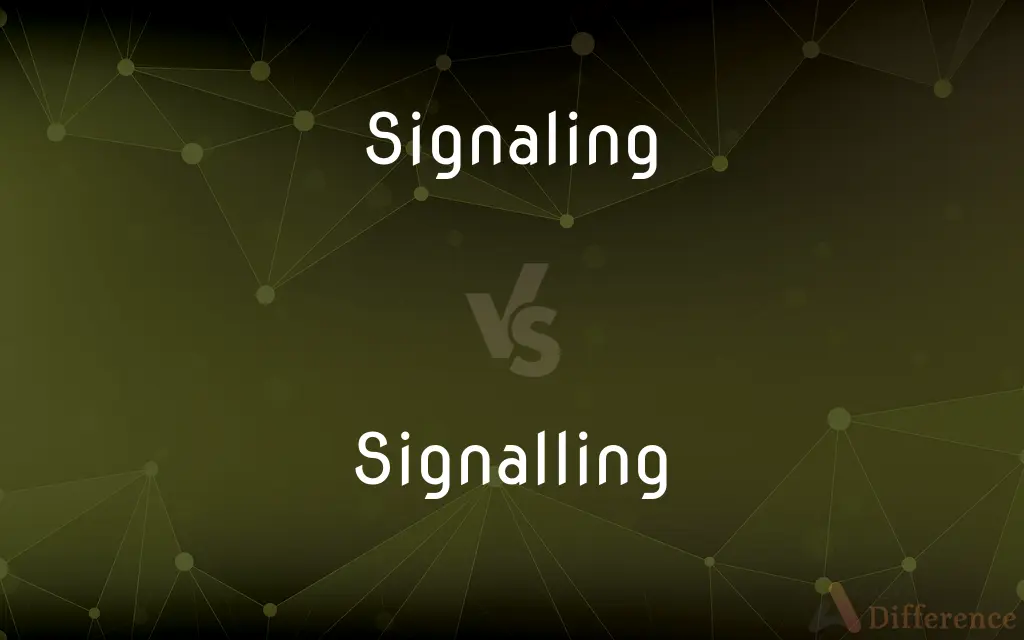Signaling vs. Signalling — What's the Difference?
By Tayyaba Rehman & Maham Liaqat — Updated on April 3, 2024
Signaling (with one 'l') is the preferred spelling in American English, used in contexts like traffic signals. Signalling (with two 'l's) is British English, common in similar contexts.

Difference Between Signaling and Signalling
Table of Contents
ADVERTISEMENT
Key Differences
Signaling is the American English version of the word, primarily used to denote the act of using signals to convey information or instructions, e.g., in telecommunications or on the roads. Whereas Signalling, spelled with an extra 'l', follows the British English convention, used similarly to indicate the act of sending signals, but it's more common in UK and Commonwealth countries.
In terms of usage, signaling is often found in technical and everyday contexts in the United States, such as signaling a turn while driving. On the other hand, signalling is preferred in academic and professional communications within the UK, such as in scientific research about cellular signalling.
Signaling can also refer to the process in economics and finance where a company indicates its health or intentions to the market through actions or announcements. Signalling, while used in the same contexts in the UK, carries the same implications but adheres to British spelling norms.
In digital communications, signaling refers to the exchange of information for network management and control. Signalling, on the other hand, is used in similar contexts outside the US, such as in the documentation of international telecommunications standards.
In the realm of biology, signaling pertains to how cells communicate with each other to perform vital functions. Signalling is used within the same scientific discussions but is more commonly seen in publications and research originating from the UK or other countries following British English conventions.
ADVERTISEMENT
Comparison Chart
Spelling
One 'l'
Two 'l's
Usage Territory
United States
United Kingdom, Commonwealth countries
Common Contexts
Traffic signals, telecommunications, finance
Similar contexts but adheres to British English conventions
Academic and Professional Communications
Used in US-centric research and documents
Preferred in UK-centric publications and research
Example Fields
Economics, digital communications, biology
Same fields but with British spelling norms
Compare with Definitions
Signaling
Traffic Indication.
The driver was cited for not signaling before changing lanes.
Signalling
Traffic Indication (UK).
He was fined for failing to use his indicators when signalling a turn.
Signaling
Telecommunications Process.
Signaling protocols are essential for network communication.
Signalling
Telecommunications Process (UK).
Signalling systems ensure seamless international calls.
Signaling
Biological Communication.
Signaling pathways play a crucial role in cell differentiation.
Signalling
Biological Communication (UK).
Research into cell signalling has advanced cancer treatment.
Signaling
Economic Indicators.
A company's expansion is often seen as a positive signaling to investors.
Signalling
Economic Indicators (UK).
Mergers may be interpreted as signalling confidence in the market.
Signaling
Digital Network Management.
The router facilitates signaling for data packet routing.
Signalling
Digital Network Management (UK).
Effective signalling is key to managing cross-border data transfers.
Signaling
An indicator, such as a gesture or colored light, that serves as a means of communication.
Signalling
An indicator, such as a gesture or colored light, that serves as a means of communication.
Signaling
A message communicated by such means.
Signalling
A message communicated by such means.
Signaling
Something that incites action
The peace treaty was the signal for celebration.
Signalling
Something that incites action
The peace treaty was the signal for celebration.
Signaling
(Biology) A physical entity, such as a chemical or an electromagnetic wave, that activates a cell receptor and elicits a specific response.
Signalling
(Biology) A physical entity, such as a chemical or an electromagnetic wave, that activates a cell receptor and elicits a specific response.
Signaling
(Electronics) An impulse or fluctuating quantity, as of electrical voltage or light intensity, whose variations represent coded information.
Signalling
(Electronics) An impulse or fluctuating quantity, as of electrical voltage or light intensity, whose variations represent coded information.
Signaling
(Computers) A sequence of digital values whose variations represent coded information.
Signalling
(Computers) A sequence of digital values whose variations represent coded information.
Signaling
The sound, image, or message transmitted or received by means of telecommunications.
Signalling
The sound, image, or message transmitted or received by means of telecommunications.
Signaling
Notably out of the ordinary
A signal feat.
A signal event.
Signalling
Notably out of the ordinary
A signal feat.
A signal event.
Signaling
To make a signal to
I signaled the driver to proceed.
Signalling
To make a signal to
I signaled the driver to proceed.
Signaling
To relate or make known by signals
They have signaled their willingness to negotiate.
Signalling
To relate or make known by signals
They have signaled their willingness to negotiate.
Signaling
To cause an effect in (a cell) by the activation of a receptor, as by a neurotransmitter or hormone.
Signalling
To cause an effect in (a cell) by the activation of a receptor, as by a neurotransmitter or hormone.
Signaling
To make a signal or signals.
Signalling
To make a signal or signals.
Signaling
(American spelling) signal
Signalling
Present participle of signal
Signaling
The sending of a biochemical or other type of signal.
Signalling
The use of signals in communications, especially the sending of signals in telecommunications
Signaling
Any communication that encodes a message;
Signals from the boat suddenly stopped
Signalling
(rail transport) the signals and associated equipment required for their operation.
Common Curiosities
What is the main difference between signaling and signalling?
The main difference is the spelling, where "signaling" is American English and "signalling" is British English.
Can signaling and signalling be used interchangeably?
Yes, but the usage depends on the regional spelling conventions of the audience.
Are there rules for when to use signaling vs. signalling?
The primary rule is based on regional language conventions: use "signaling" for US audiences and "signalling" for UK or Commonwealth countries.
How does signaling work in digital communications?
It involves the exchange of control information used for system management and data transfer paths.
What role does signalling play in biology?
It's crucial for cellular communication, affecting processes like growth, healing, and response to stimuli.
In which documents would I find "signaling" used?
Primarily in American publications, official documents, and technical manuals.
Where is "signalling" commonly found?
In British and Commonwealth countries' publications, research papers, and academic materials.
Is the meaning of signaling different in various contexts?
Yes, its meaning varies by context, such as telecommunications, biology, and road traffic, but the core concept of conveying information remains constant.
Do the terms have different pronunciations?
No, "signaling" and "signalling" are pronounced the same.
Why is cellular signalling important in medical research?
Understanding it can lead to breakthroughs in treating diseases by manipulating cellular responses.
Why do some English words have different spellings in the US and UK?
Historical language evolution and standardization practices have led to differences in spelling conventions.
What is an example of economic signaling?
A company increasing its dividend as a positive signal to its investors.
How does signaling affect telecommunications?
Efficient signaling ensures reliable and seamless communication across networks.
Is there a preference for signaling or signalling in international contexts?
The preference often aligns with the originating country's English dialect, but international standards may use either based on the governing body's location.
Can American English speakers use "signalling"?
They can, but it may be marked as a spelling error unless referring to British English contexts.
Share Your Discovery

Previous Comparison
Agree vs. Consent
Next Comparison
Ammine vs. AmineAuthor Spotlight
Written by
Tayyaba RehmanTayyaba Rehman is a distinguished writer, currently serving as a primary contributor to askdifference.com. As a researcher in semantics and etymology, Tayyaba's passion for the complexity of languages and their distinctions has found a perfect home on the platform. Tayyaba delves into the intricacies of language, distinguishing between commonly confused words and phrases, thereby providing clarity for readers worldwide.
Co-written by
Maham Liaqat















































